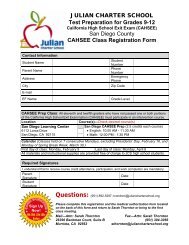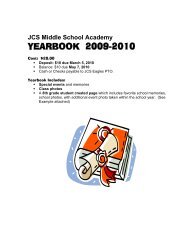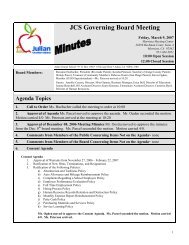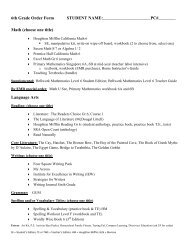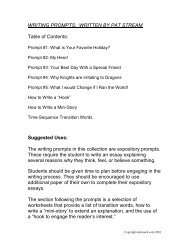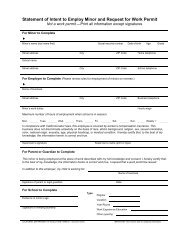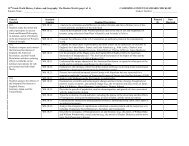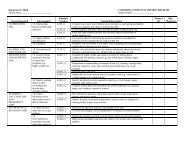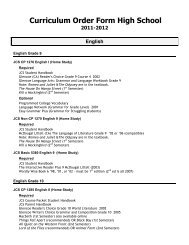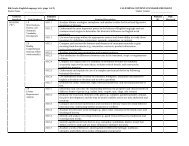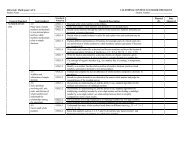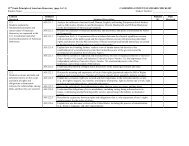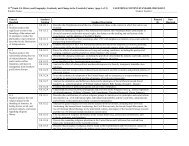2009-2010 Self-Study WASC Action Plan - Julian Charter School
2009-2010 Self-Study WASC Action Plan - Julian Charter School
2009-2010 Self-Study WASC Action Plan - Julian Charter School
Create successful ePaper yourself
Turn your PDF publications into a flip-book with our unique Google optimized e-Paper software.
ASSESSMENT AREAS OF STRENGTH<br />
• The board and other stakeholders use student achievement to<br />
drive the allocation of resources and program changes.<br />
• Administrators and staff use assessment information to<br />
develop goals for curricular and professional development.<br />
• The school is moving toward common assessments, beginning<br />
with core subject finals at the high school level and benchmarks<br />
in K-8.<br />
• PLCs are in place to help with student progress monitoring;<br />
monitoring is at an individual, group, and program level.<br />
• Numerous strategies are used for student assessment and to<br />
modify instruction.<br />
• Teachers are working in PLCs, departments, and curriculum<br />
teams to discuss how to use assessment findings to better effect<br />
instruction so all students benefit from the group wisdom.<br />
• A wide-variety of student performance data is gathered. This<br />
includes both summative and formative data.<br />
• DataDirector allows staff members to analyze student data.<br />
• JCS has put in place, and allowed the time for, PLCs. Part of<br />
the role of the PLC groups is: 1) disaggregation, analysis and<br />
reporting on student data, 2) curricular development based<br />
on assessment data, and 3) professional development.<br />
ASSESSMENT AREAS OF GROWTH<br />
• Provide continual education, including group time for<br />
collaboration, as teachers are learning to use the recently<br />
adopted systems (e.g., DataDirector) effectively.<br />
• Add further common assessments at all grade levels to<br />
ensure all students are being served and are meeting state<br />
academic standards and school ESLRs.<br />
• Build teacher comfort level/ability to examine student data.<br />
• Find alternative ways to meet to expand the time spent in<br />
groups for analysis: teachers need time to continue to discuss<br />
how to use assessment findings when modifying curriculum<br />
and instruction. Also under discussion is how to delve deeper<br />
into subjects, while still understanding that there is a body of<br />
standards that need to be mastered within a limited time<br />
period. Conversely, for students moving through the standards<br />
quickly, there is much room for enrichment within the<br />
grade level work that can lead to a deeper understanding of<br />
the subject matter.<br />
Chapter 4: <strong>Self</strong>-<strong>Study</strong> Findings: Assessment and Accountability<br />
84 <strong>Julian</strong> <strong>Charter</strong> <strong>School</strong> Focus on Learning <strong>2009</strong>-<strong>2010</strong>



